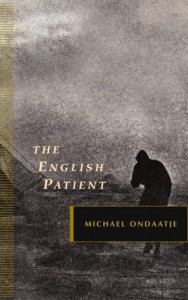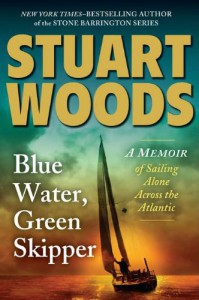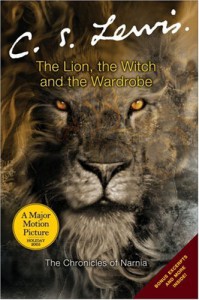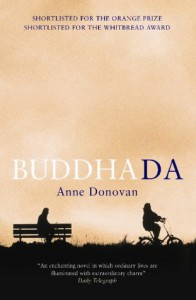 At first bein a Buddhist didnae see tae make that much difference tae ma da. He used tae go doon the pub on a Tuesday and noo he went tae the Buddhist Centre tae meditate. Same difference. He never talked aboot it, wis still the same auld da, gaun tae his work, cairryin on in the hoose. He stuck a photie of the Buddha up on the unit in their bedroom and noo and again he'd go in there and shut the door insteid of watchin the telly -- meditatin, he said. Ah thought he'd get fed up wi it. He wisnae a great wan for hobbies, my da, but sometimes he'd decide tae take on whit he cries 'a wee project'. Wanst it wis buildin a gairden shed, anither time it wis strippin an auld sideboard that came fae my granny's. And of course he'd start it then get fed up and no finish. It drives ma ma roon the bend.
At first bein a Buddhist didnae see tae make that much difference tae ma da. He used tae go doon the pub on a Tuesday and noo he went tae the Buddhist Centre tae meditate. Same difference. He never talked aboot it, wis still the same auld da, gaun tae his work, cairryin on in the hoose. He stuck a photie of the Buddha up on the unit in their bedroom and noo and again he'd go in there and shut the door insteid of watchin the telly -- meditatin, he said. Ah thought he'd get fed up wi it. He wisnae a great wan for hobbies, my da, but sometimes he'd decide tae take on whit he cries 'a wee project'. Wanst it wis buildin a gairden shed, anither time it wis strippin an auld sideboard that came fae my granny's. And of course he'd start it then get fed up and no finish. It drives ma ma roon the bend. If you're not Scottish, it may take a few pages to read this one at a normal speed, since you'll need to sound out the language to make sense of it. But it's marvelously worth the work. [b:Buddha Da|391368|Buddha Da|Anne Donovan|http://d.gr-assets.com/books/1331948924s/391368.jpg|1741741] is a great story of what happens in a working class Scottish family when Dad takes up with the local Buddhist lamas and starts to change. The chapters alternate narrators, starting with 12 year old Anne Marie, moving to wife Liz, and finally moving to Jimmy, and then switching back and forth as the plot requires. In any family system, if someone changes too much, it's disruptive, even if the change is a good one, and so it goes with Jimmy's increasing commitment to Buddhism, which for a time he moves toward with blinders on, failing to comprehend the degree to which he is neglecting his loved ones as he does so. Donovan does a wonderful job of shifting between the characters and making the voice of each believable. All are likable--this is a family you'd be glad to be a part of, even as you sometimes want to shake them to their senses when they make stupid decisions.
A few weeks ago I reviewed a Thich Nhat Hanh retelling of a Vietnamese folktale. One of the things that annoyed me about that book was how didactic it felt. I love Thich Nhat Hanh's non-fiction and was frustrated that the novel felt heavy-handed. Donovan, on the other hand, writes a masterful novel, but actually manages to do a little teaching about Buddhism without breaking stride a bit. The reader learns little nuggets about theory and practice along with Jimmy, but they never overpower the storytelling or detract from the realism of the dialogue.
I strongly recommend this book, it moves quickly and is full of life.
 1
1
 He was ashamed to say aloud that he wished the house to look neat on this day. The hole was barely large enough to admit his hand and he thrust it out to feel of the air. A small soft wind blew gently from the east, a wind mild and murmurous and full of rain. It was a good omen. The fields needed rain for fruition. There would be no rain this day, but within a few days, if this wind continued, there would be water. It was good. Yesterday he had said to his father that if this brazen, glittering sunshine continued, the wheat could not fill in the ear. Now it was as if Heaven had chosen this day to wish him well. Earth would bear fruit.
He was ashamed to say aloud that he wished the house to look neat on this day. The hole was barely large enough to admit his hand and he thrust it out to feel of the air. A small soft wind blew gently from the east, a wind mild and murmurous and full of rain. It was a good omen. The fields needed rain for fruition. There would be no rain this day, but within a few days, if this wind continued, there would be water. It was good. Yesterday he had said to his father that if this brazen, glittering sunshine continued, the wheat could not fill in the ear. Now it was as if Heaven had chosen this day to wish him well. Earth would bear fruit. [b:The Good Earth|1078|The Good Earth|Pearl S. Buck|http://d.gr-assets.com/books/1347262860s/1078.jpg|2346070], [a:Pearl S. Buck|704|Pearl S. Buck|http://d.gr-assets.com/authors/1344969427p2/704.jpg]'s beautiful Pulitzer Prize-winning novel of a Chinese farmer's life, opens with an extended description of Wang Lung's preparations on his wedding day. He is a humble farmer, living alone with his aging father, working the land with his ox. He is being wed to a slave from the local estate. His father tells him that he will get for him a good woman, though not beautiful. Wang Lung asks only that she not be pock-marked and that she not have a cleft lip. As the story unfolds, we watch the development of their relationship as they face the challenges of rural life.
Central to Wang Lung's character is his love of the land--his sense of it's preciousness as a resource and as a means of remaining connected to his values. As social and financial pressures come to bear, and as disaster or good fortune alter the course of his family's journey, this connection to the land is often critical to the family's physical and moral survival. From the book's early pages, we learn that pride and vanity may be a source of peril for Wang Lung, but we also see his basic decency, industriousness, and loyalty. Buck paints a portrait of a flawed man who nonetheless is worthy of much affection and respect.
The other characters in the novel, Wang Lung's family and neighbors, are well-crafted and memorable, growing in depth as the novel progresses. The portrait of rural Chinese life prior to the Communist revolution is fascinating. The vision of the sharply divided gender hierarchy is hard for a modern reader to accept--children are either sons, in which case they are prized, or slaves, in which case they are as likely to be sold off to a wealthier neighbor as to be married off with a dowry. When drought comes, its devastation is dramatically illustrated as the people of the countryside become more and more desperate when crops die and supplies are gradually exhausted. People's most basic character strengths and weaknesses come to the fore. This is a book about ingenuity, perseverance, and courage, about pride, vanity, and jealousy, but also about loyalty and compassion. It moves relatively slowly, in keeping with the slow, steady pace of country life, but is never ponderous. It leaves one with a deep sense of quiet admiration and contentment.
 1
1
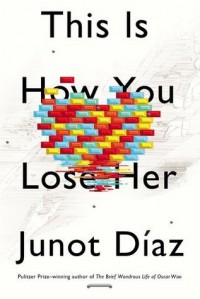 Your girl catches you cheating. (Well, actually she’s your fiancée, but hey, in a bit it so won’t matter.) She could have caught you with one sucia, she could have caught you with two, but as you’re a totally batshit cuero who didn’t ever empty his email trash can, she caught you with fifty! Sure, over a sixyear period, but still. Fifty fucking girls? Goddamn. Maybe if you’d been engaged to a super open-minded blanquita you could have survived it—but you’re not engaged to a super openminded blanquita. Your girl is a badass salcedeña who doesn’t believe in open anything; in fact the one thing she warned you about, that she swore she would never forgive, was cheating. I’ll put a machete in you, she promised. And of course you swore you wouldn’t do it. You swore you wouldn’t. You swore you wouldn’t.
Your girl catches you cheating. (Well, actually she’s your fiancée, but hey, in a bit it so won’t matter.) She could have caught you with one sucia, she could have caught you with two, but as you’re a totally batshit cuero who didn’t ever empty his email trash can, she caught you with fifty! Sure, over a sixyear period, but still. Fifty fucking girls? Goddamn. Maybe if you’d been engaged to a super open-minded blanquita you could have survived it—but you’re not engaged to a super openminded blanquita. Your girl is a badass salcedeña who doesn’t believe in open anything; in fact the one thing she warned you about, that she swore she would never forgive, was cheating. I’ll put a machete in you, she promised. And of course you swore you wouldn’t do it. You swore you wouldn’t. You swore you wouldn’t.And you did.
This is the opening section of one of the stories in [b:This is How You Lose Her|13503109|This is How You Lose Her|Junot Díaz|http://d202m5krfqbpi5.cloudfront.net/books/1342596676s/13503109.jpg|19051762], a lively story collection by Pulitzer winner [a:Junot Díaz|55215|Junot Díaz|http://d202m5krfqbpi5.cloudfront.net/authors/1363571901p2/55215.jpg], whose [b:The Brief Wondrous Life of Oscar Wao|297673|The Brief Wondrous Life of Oscar Wao|Junot Díaz|http://d202m5krfqbpi5.cloudfront.net/books/1349041446s/297673.jpg|3281466] I loved so much last year.
I didn't like this collection quite as much, partly perhaps because of the huge culture shock of shifting from reading about the Tudor court in Hilary Mantel's books just before, and partly because the style was already familiar from Oscar Wao. These are engaging, colorful stories. They made me laugh at times, and they captured the world of Dominican immigrants to the US in sometimes powerful ways. The language flows back and forth between English and Spanish, between street and Harvard. It is not a book you can listen to with a five year-old in the car. There's rarely a section that lasts long that is even PG-13.
And I think my other reservation about these stories is that the male characters never really outgrow being 15 year-old street kids. On one hand that is not completely fair, perhaps, but there is never something that feels like real deep, empathic love for a woman in these stories. There is longing, there is loss, there is a lot of lust, but I'm not sure there is ever much love. I've spent weeks reading about a guy who got a number of people beheaded, and I like and respect him more than the characters in these stories, because there was a depth of feeling, of loyalty, of generativity in Mantel's Thomas Cromwell that is notably absent here. These characters have to do a lot just to survive the cultural transitions and divides that challenge them, to find a way to make it in the US, and maybe that should be enough.
All and all, though, these are a good read, and I'm glad to have been able to enjoy them.
 1
1
Defending Jacob

This was a book group read. It's a courtroom/crime novel with a twist, as the District Attorney finds himself dealing with a case in which his son becomes a suspect. It's not stellar from a literary perspective, but it is an interesting read from a psychological one. The book is about family relationships, about nature vs. nurture and violence, about the degree to which we are willing to be honest with ourselves in the face of frightening information, and about ethical choices in parenting. My three stars are probably actually a 3 and a half because of the degree to which I've been thinking about it since I read it. Some people have criticized the plot as slow, but I didn't have any issues with the pacing, and everyone in the book group seems to have liked it (although I ended up missing the meeting due to a sick kid!).
 1
1
 A quick enjoyable read about forbidden romance on Fiji in the 1970s. The story is told with an appealing self-deprecating wit.
A quick enjoyable read about forbidden romance on Fiji in the 1970s. The story is told with an appealing self-deprecating wit.
 My heart is weak and unreliable. When I go it will be my heart. I try to burden it as little as possible. If something is going to have an impact, I direct it elsewhere. My gut for example, or my lungs, which might seize up for a moment but have never yet failed to take another breath. When I catch a mirror and catch a glimpse of myself, or I'm at the bus stop and some kids come up behind me and say, Who smells shit?--small daily humiliations--these I take, generally speaking, in my liver. Other damages I take in other places. The pancreas I reserve for being struck by all that's been lost. It's true there's so much and the organ is small. But. You would be surprised how much it can take, all I feel is a quick sharp pain and then it's over. Sometimes I imagine my own autopsy. Disappointment in myself: right kidney. Personal failures: kiskes. I don't mean to sound like I've made a science of it. It's not that well thought out. I take it where it comes. It's just that I notice certain patterns. When the clocks are turned back and the dark falls before I am ready, this, for reasons I can't explain, I feel in my wrists. And when I wake up and my fingers are stiff, almost certainly I was dreaming of my childhood. The field where we used to play, the field where everything was discovered and everything was possible. (We ran so hard we thought we would spit blood: to me that is the sound of childhood, heavy breathing and shoes scraping the hard earth.) Stiffness of the fingers is the dream of childhood as it's been returned to me at the end of my life. I have to run them under the hot water, steam clouding the mirror, outside the rustle of pigeons. Yesterday I saw a man kicking a dog and I felt it behind my eyes. I don't know what to call this, a place before tears. The pain of forgeting: spine. The pain of remembering: spine. All the times that I have suddenly realized that my parents are dead, even now, it still surprises me, to exist in the world while that which made me has ceased to exist: my knees, it takes half a tube of Ben-Gay and a big production just to bend them. To everything a season, to every time I've woken only to make the mistake of believing for a moment that someone was sleeping beside me: a hemorrhoid. Loneliness: there is no organ that can take it all.
My heart is weak and unreliable. When I go it will be my heart. I try to burden it as little as possible. If something is going to have an impact, I direct it elsewhere. My gut for example, or my lungs, which might seize up for a moment but have never yet failed to take another breath. When I catch a mirror and catch a glimpse of myself, or I'm at the bus stop and some kids come up behind me and say, Who smells shit?--small daily humiliations--these I take, generally speaking, in my liver. Other damages I take in other places. The pancreas I reserve for being struck by all that's been lost. It's true there's so much and the organ is small. But. You would be surprised how much it can take, all I feel is a quick sharp pain and then it's over. Sometimes I imagine my own autopsy. Disappointment in myself: right kidney. Personal failures: kiskes. I don't mean to sound like I've made a science of it. It's not that well thought out. I take it where it comes. It's just that I notice certain patterns. When the clocks are turned back and the dark falls before I am ready, this, for reasons I can't explain, I feel in my wrists. And when I wake up and my fingers are stiff, almost certainly I was dreaming of my childhood. The field where we used to play, the field where everything was discovered and everything was possible. (We ran so hard we thought we would spit blood: to me that is the sound of childhood, heavy breathing and shoes scraping the hard earth.) Stiffness of the fingers is the dream of childhood as it's been returned to me at the end of my life. I have to run them under the hot water, steam clouding the mirror, outside the rustle of pigeons. Yesterday I saw a man kicking a dog and I felt it behind my eyes. I don't know what to call this, a place before tears. The pain of forgeting: spine. The pain of remembering: spine. All the times that I have suddenly realized that my parents are dead, even now, it still surprises me, to exist in the world while that which made me has ceased to exist: my knees, it takes half a tube of Ben-Gay and a big production just to bend them. To everything a season, to every time I've woken only to make the mistake of believing for a moment that someone was sleeping beside me: a hemorrhoid. Loneliness: there is no organ that can take it all.These are the words of elderly Jewish immigrant Leo Gursky, one of the two main narrators of [b:The History of Love|3867|The History of Love|Nicole Krauss|http://d.gr-assets.com/books/1327911009s/3867.jpg|1882970]. The other is a teenage girl named Alma who is desperately trying to pull her mother back into the world from wherever she has gone since the death of the girl's father from pancreatic cancer. The lives of the two will eventually cross because of a book, also called The History of Love, which is a collection of short stories all about a girl named Alma. The book, written in Spanish, was given by Alma's father to her mother soon after they met, and is the source of her name. When her mother is asked by a mysterious correspondent to translate the book to English, Alma begins to research the other Alma, believing that she must be a real person.
This is a story of love, of family, of friendship, of tremendous loss, of Jewish identity. The characters are delightful and quirky, the relationships poignant. It is a quick and rewarding read, and deserves its place on the latest 1001 Books list.
 "If you intend to kill me in public, and mount a show, be quick. Or I may die of grief alone in this room."
"If you intend to kill me in public, and mount a show, be quick. Or I may die of grief alone in this room." He shakes his head. "You'll live." He once thought it himself, that he might die of grief. For his wife, his daughters, his sisters, his father and master the cardinal. But the pulse, obdurate, keeps its rhythm. You think you cannot keep breathing, but your ribcage has other ideas, rising and falling, emitting sighs. You must thrive in spite of yourself. And so that you may do it, God takes out your heart of flesh and gives you a heart of stone.
This sums up the change in Thomas Cromwell from [b:Wolf Hall|6101138|Wolf Hall (Thomas Cromwell, #1)|Hilary Mantel|http://d202m5krfqbpi5.cloudfront.net/books/1336576165s/6101138.jpg|6278354] into this novel. He is a colder, more calculating man, tasting vengeance against those who had humiliated and caused the death of his mentor Cardinal Wolsey. He also doesn't have the same opportunities to exercise his gentler side. His family is essentially gone: wife and daughters dead, son, nephew, and ward all grown and living outside his house. His life is really all business now. There are other changes too. He is rethinking the nature of his relationship with his late father, which is fascinating to watch. And we begin to see the politics of the court shift, and while on the surface, his career is still on the rise, we begin to see cracks through which he will eventually fall.
Mantel is tremendously talented. I finished this book and yearned to be able to start the next one right away. Unfortunately, it is not due out for 2 more years. I will try to be patient, and I will have to explore some other novels by [a:Hilary Mantel|58851|Hilary Mantel|http://d202m5krfqbpi5.cloudfront.net/authors/1334862633p2/58851.jpg] in the meantime.
 Was impressed with how well this still works despite how long ago it was written. Reminded me a bit of 1001 Nights because the numerous nested stories.
Was impressed with how well this still works despite how long ago it was written. Reminded me a bit of 1001 Nights because the numerous nested stories.
 It was a warm day, almost the end of March, and I stood outside the barbershop looking up at the jutting neon sign of a second floor dine and dice emporium called Florian's. A man was looking up at the sign too. He was looking up at the dusty windows with a sort of ecstatic fixity of expression, like a hunky immigrant catching his first sight of the Statue of Liberty. He was a big man but not more than six feet five inches tall and not wider than a beer truck. He was about ten feet away from me. His arms hung loose at his sides and a forgotten cigar smoked behind his enormous fingers.
It was a warm day, almost the end of March, and I stood outside the barbershop looking up at the jutting neon sign of a second floor dine and dice emporium called Florian's. A man was looking up at the sign too. He was looking up at the dusty windows with a sort of ecstatic fixity of expression, like a hunky immigrant catching his first sight of the Statue of Liberty. He was a big man but not more than six feet five inches tall and not wider than a beer truck. He was about ten feet away from me. His arms hung loose at his sides and a forgotten cigar smoked behind his enormous fingers. ...The doors swung back outwards and almost settled to a stop. Before they had entirely stopped moving they opened again, violently, outwards. Something sailed across the sidewalk and landed in the gutter between two parked cars. It landed on its hands and knees and made a high keening noise like a cornered rat. It got up slowly, retrieved a hat and stepped back onto the sidewalk. It was a thin, narrow-shouldered brown youth in a lilac colored suit and a carnation. It had slick black hair. It kept its mouth open and whined for a moment. People stared at it vaguely. Then it settled its hat jauntily, sidled over to the wall and walked silently splay-footed off along the block.
Silence. Traffic resumed. I walked along to the double doors and stood in front of them. They were motionless now. It wasn't any of my business. So I pushed them open and looked in.
With writing like this, how can you not enjoy a nice noir mystery? [b:Farewell, My Lovely|2050|Farewell, My Lovely (Philip Marlowe, #2)|Raymond Chandler|http://d.gr-assets.com/books/1320550157s/2050.jpg|1263111] is a brilliant effort from [a:Raymond Chandler|1377|Raymond Chandler|http://d.gr-assets.com/authors/1206535318p2/1377.jpg], and definitely deserves its place on the 1001 Books list. Marlowe is smart but not smart enough not to get hurt, or end up with a bout of the DTs, but you want him to succeed in his quest to figure out what is going on in the situation he links himself to inextricably by pushing these doors open to look in. He makes wry and witty observations about life, pisses off most of the people he meets, and knows a decent person when I encounters one.
I have always enjoyed [a:Robert B. Parker|397|Robert B. Parker|http://d.gr-assets.com/authors/1354149354p2/397.jpg]'s Spenser, and he is clearly modeled on Marlowe. It is no surprise that Parker at one point finished an unfinished Chandler novel. He was the right man to do it, but nothing equals the original. Chandler's voice and eye for detail are flawless. He has a marvelous sense of pacing and creates delicious characters to play out his drama. He even quotes a little Shakespeare when you least expect it. I feel crazy giving this 5 stars when I've given so many other excellent books just 4, but this is the best of a genre, so it gets all 5.
 This book makes a passionate case for liberal American Jews to take seriously and act to combat the erosion of liberal values in the governmental policies of today's Israel. He makes a persuasive argument that the country has strayed dangerously from the principles upon which it was founded, and that, through relative indifference and inaction, the liberal majority of American Jewry has ceded the community's voice on the matter to a wealthy right-wing minority that powerfully influences American foreign policy. The book is an important wake-up call to the American Jewish community.
This book makes a passionate case for liberal American Jews to take seriously and act to combat the erosion of liberal values in the governmental policies of today's Israel. He makes a persuasive argument that the country has strayed dangerously from the principles upon which it was founded, and that, through relative indifference and inaction, the liberal majority of American Jewry has ceded the community's voice on the matter to a wealthy right-wing minority that powerfully influences American foreign policy. The book is an important wake-up call to the American Jewish community.
 Funny book. Think of this as 3 1/2 stars. It's a good book, but it's not Austen or Eliot or Atwood or any of those other folks I give 4 stars to. And I tend to be really stingy with 5s. So trust me--it's funny and off-beat and self-deprecating and all the things you'd expect from Tina Fey. Unfortunately, I can't find a way to give you a good taste of it because the humor builds across a section, and I'd probably be sued for copyright stuff if I gave you enough to get a taste (but you can do it with the Amazon Look Inside feature). Trust me, it is funny enough in parts to have had me annoying my husband who is trying to sleep cause I couldn't stifle the laughs enough. It's fun to walk through Tina Fey's life. And I came away not only liking her politics (which always helps) but liking her. I think she is a nice person. That's a good thing. And boy was this a quick and easy read compared to most of what I have on my bookshelf. Think of it as a palate cleanser between the serious stuff.
Funny book. Think of this as 3 1/2 stars. It's a good book, but it's not Austen or Eliot or Atwood or any of those other folks I give 4 stars to. And I tend to be really stingy with 5s. So trust me--it's funny and off-beat and self-deprecating and all the things you'd expect from Tina Fey. Unfortunately, I can't find a way to give you a good taste of it because the humor builds across a section, and I'd probably be sued for copyright stuff if I gave you enough to get a taste (but you can do it with the Amazon Look Inside feature). Trust me, it is funny enough in parts to have had me annoying my husband who is trying to sleep cause I couldn't stifle the laughs enough. It's fun to walk through Tina Fey's life. And I came away not only liking her politics (which always helps) but liking her. I think she is a nice person. That's a good thing. And boy was this a quick and easy read compared to most of what I have on my bookshelf. Think of it as a palate cleanser between the serious stuff.







